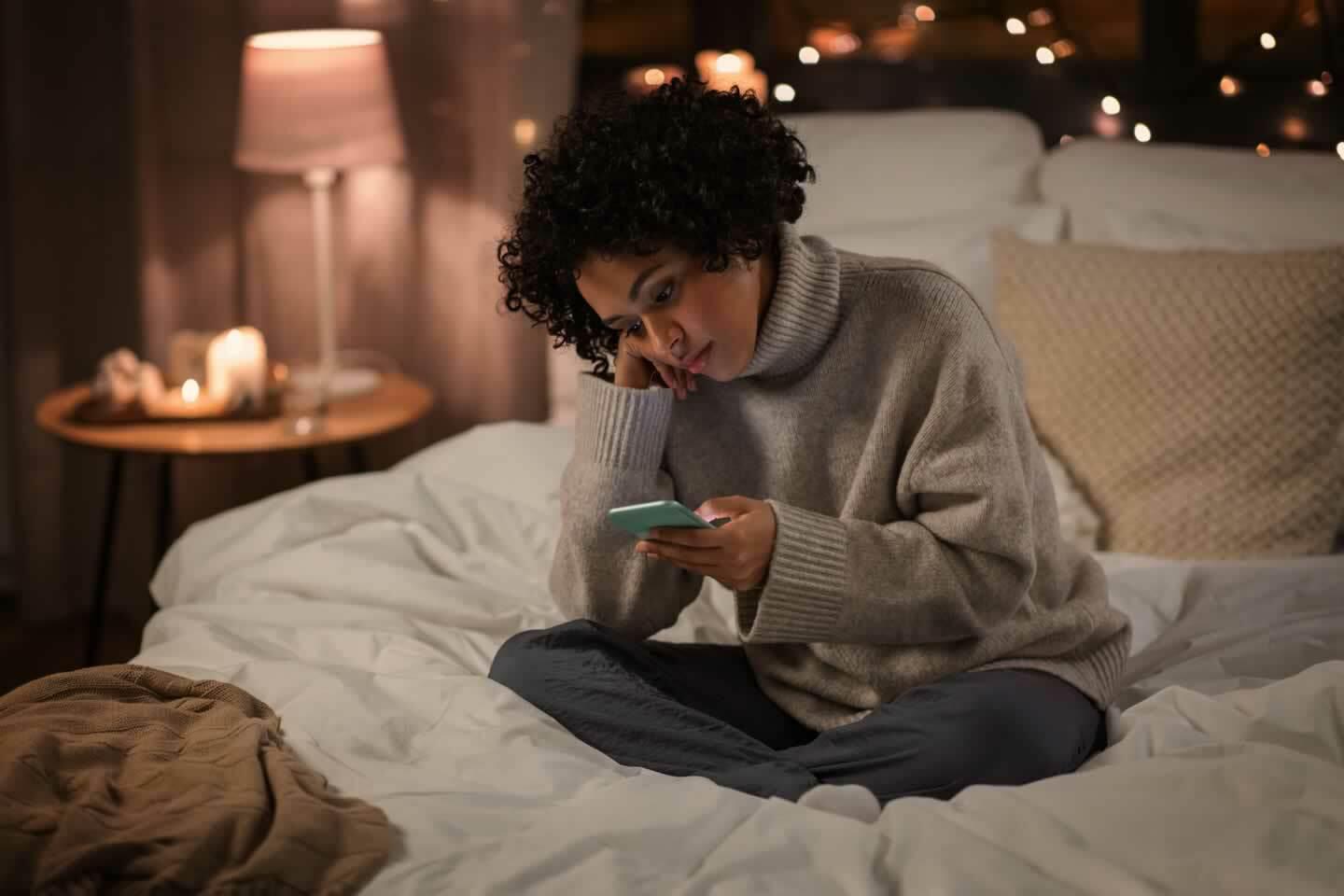Technology has become an integral part of our daily lives, including our bedtime routines. Many people use electronic devices right before bed, whether scrolling through social media, watching TV, or responding to emails, leading to much research into the relationship between technology and sleep. Join us as we explore how technology affects sleep, debunk common myths, and offer practical tips for creating a more restful, tech-free sleep environment.
Table of Contents
How Technology and Sleep Are Connected
Technology plays a major role in disrupting both the quantity and quality of our sleep. While it may seem harmless to check your phone or watch TV before bed, electronic devices can interfere with the natural sleep process in several ways:
- Delayed Sleep Time Using electronic devices before bed often delays the time you actually fall asleep. Whether binge-watching a show or scrolling through social media, the distractions prolong bedtime, resulting in fewer hours of rest.
- Brain Stimulation Engaging with devices keeps your brain active, making it harder to wind down. Interactive activities, like texting or playing games, stimulate the mind, preventing it from reaching a relaxed state necessary for sleep.
- Light and Sound Disruptions Even after falling asleep, the lights and sounds from devices can interrupt your sleep cycle. Notifications, blinking lights, and vibrations can cause you to wake up in the middle of the night, affecting your ability to get deep, restorative sleep.
- Blue Light Exposure The blue light emitted by phones, tablets, and other screens directly impacts your body’s production of melatonin, the hormone responsible for regulating sleep. Blue light suppresses melatonin levels, which can throw off your circadian rhythm, making it harder to fall and stay asleep naturally.
Each of these factors contributes to poor sleep, which can leave one feeling less rested and more fatigued the next day.
Sleep Myths: “Watching TV Helps Me Fall Asleep”
Many people believe that watching TV before bed helps them relax and fall asleep faster. While it may feel like a calming way to unwind after a long day, this habit can actually do more harm than good when it comes to your sleep quality. Watching TV stimulates the brain, especially if watching exciting or emotionally charged content. The visuals, story line, and even the background noise can keep your mind engaged, making it harder for your brain to transition into a restful state. Rather than helping you relax, TV may delay your natural sleeping process, keeping your brain active when it should be winding down.
How to Wind Down Before Bed Without Technology
Reducing your reliance on technology before bed can greatly improve your sleep quality. Here are some practical, easy-to-follow tips to help you or your family create healthier nighttime habits:
- Set a Tech-Free Bedtime Routine Design a wind-down routine that doesn’t involve screens – power down all electronic devices at least 30 to 60 minutes before going to bed. Instead, engage in activities that promote relaxation, like reading, journaling, or practicing mindfulness. This allows your brain to shift into a more restful state, preparing you for better sleep.
- Create a Designated Charging Station Outside the Bedroom Charge your phone, tablet, and other devices outside of the bedroom to remove the temptation of checking them in bed. Keeping devices out of reach encourages you to stay focused on sleep rather than being distracted by notifications or late-night browsing.
- Use a Traditional Alarm Clock Switch to a traditional alarm clock to eliminate the need for a phone in the bedroom altogether – many people rely on their phones as alarms, which can lead to unnecessary screen time before bed or during the night. This simple change can help you avoid checking your phone when you wake up overnight or first thing in the morning.
- Enable Night Mode or Blue Light Filters Make sure,if you absolutely must use your device before bed, to enable night mode or a blue light filter on your phone or computer. These settings reduce blue light emissions, making it less disruptive to your melatonin production. While it’s best to avoid screens entirely before bed, blue light filters can help mitigate some of the negative effects if screen use is unavoidable.
- Schedule “No-Tech” Family Time in the Evenings Set aside specific times in the evening for your family to enjoy tech-free activities together. Whether it’s playing board games, talking, or reading stories to your children, this screen-free time not only helps improve sleep but also strengthens family bonds.
By gradually implementing these steps, you can reduce technology’s impact on your sleep and foster healthier habits that lead to more restful nights.
How AFC Raleigh NC Can Help
At AFC Raleigh NC, we know that sleep plays a critical role in your overall health and well-being. Poor sleep can affect your energy levels, mental clarity, and even your immune system, making it harder for your body to stay healthy. If you're struggling to improve your sleep despite making lifestyle changes like reducing technology use, our healthcare providers are here to help. Contact AFC Raleigh NC today. Our urgent care healthcare providers are here to offer personalized solutions to help you get better rest and feel your best.



